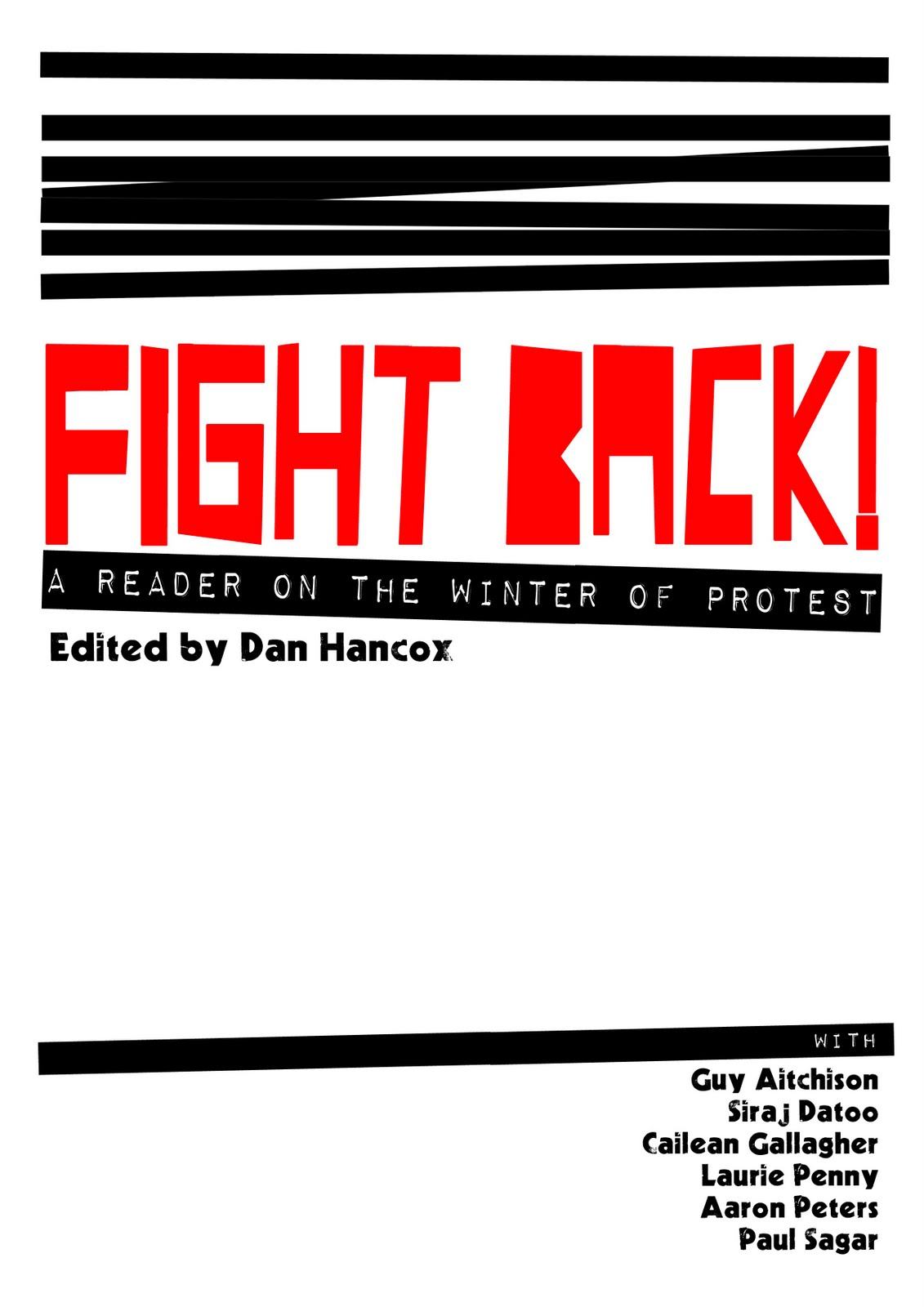Dan Hancox (ed.): Fight Back! A Reader on the Winter of Protest (2011)
Filed under book | Tags: · activism, democracy, education, internet, politics, protest, resistance, social movements, united kingdom

The first book to be produced by an ‘editorial kettle’ – all seven of its editors are under 30 and have been kettled by the police during 2010 winter protests in United Kingdom. Fight Back! features 350 pages of reports, analysis, images, reflections and overviews on the UK’s winter of protests by 43 authors. It asks: Is this the start of a successful movement against fees and cuts? From a 15-year-old UK Uncut flash-mob activist to a rebel Lib Dem peer – Fight Back! captures both the spirit and arguments of Britain’s winter revolt, bringing together the best reportage and analysis of an extraordinary political moment.
Editorial Kettle: Guy Aitchison, Siraj Datoo, Cailean Gallagher, Laurie Penny, Aaron Peters and Paul Sagar
Published by openDemocracy via OurKingdom, London, February/March 2011
ISBN 978 0 955677 502
340 pages
Licensed under Creative Commons
editor
publisher and more on the protests
Fibreculture Journal 17: Unnatural Ecologies (2011)
Filed under journal | Tags: · aesthetics, biology, biopolitics, capitalism, genetics, media, media ecology, nature, p2p, politics, subjectivation, technology, theory
Media ecology has always resonated with discussions of digital and networked media. Perhaps this is because the discipline of media ecology has always been so open to transdisciplinary work. The pioneers of media ecology set off very early on the road to transdiscplinary critique that is a key focus for the Fibreculture Journal. Indeed, media ecological critique is often critique in the best sense: the exploration of the limits, not just the errors of thinking, the immersion of thought in real events and practices, and the creation of new ideas appropriate to the present and future of media. All in all, from Innis and McLuhan on, media ecology has provided a generative engine within media thinking and practice. Indeed it has been exemplary thinking as practice.
Yet the leading scholars writing for the Unnatural Ecologies issue do not perform media ecology as we have known it. At times the articles argue with more “traditional” media ecology. Sometimes, they arrive at a new media ecology, having travelled other trajectories that those of traditional media ecology. They are rewriting media ecology, exploring its limits from inside and outside. In the process the Fibreculture Journal believes this issue makes a crucial contribution to thinking about all media from the perspective of digital and networked media. In thinking through the unnatural ecologies that contemporary media make increasingly obvious, the issue challenges us to rethink not only what media are, or what they do, but what they might have been, and what they have done.
Articles:
Michael Goddard: Towards an Archaeology of Media Ecologies: ‘Media Ecology’, Political Subjectivation and Free Radios
Olga Goriunova: Autocreativity and Organisational Aesthetics in Art Platforms
Jussi Parikka: Media Ecologies and Imaginary Media: Transversal Expansions, Contractions, and Foldings
Matteo Pasquinelli: Four Regimes of Entropy: For an Ecology of Genetics and Biomorphic Media Theory
Matthew Fuller: Faulty Theory
Phoebe Moore: Subjectivity in the Ecologies of P2P Production
Issue edited by Michael Goddard and Jussi Parikka
Publisher: Fibreculture Publications/The Open Humanities Press, Sydney, Australia, April 2011
ISSN: 1449 – 1443
PDF (PDF)
PDF (EPUB)
View online (HTML articles)
Chantal Mouffe: The Democratic Paradox (2000–) [EN, ES, PL]
Filed under book | Tags: · agonism, agonistic pluralism, antagonism, deliberative democracy, democracy, ethics, neoliberalism, philosophy, pluralism, politics, social democracy

“A new understanding of democracy that acknowledges the inescapable and essential antagonism in its workings.
From the theory of ‘deliberative democracy’ to the politics of the ‘third way’, the present Zeitgeist is characterized by attempts to deny what Chantal Mouffe contends is the inherently conflictual nature of democratic politics. Far from being signs of progress, such ideas constitute a serious threat to democratic institutions. Taking issue with John Rawls and Jürgen Habermas on one side, and the political tenets of Blair, Clinton and Schröder on the other, Mouffe brings to the fore the paradoxical nature of modern liberal democracy in which the category of the ‘adversary’ plays a central role. She draws on the work of Wittgenstein, Derrida, and the provocative theses of Carl Schmitt, to propose a new understanding of democracy which acknowledges the ineradicability of antagonism in its workings.”
Publisher Verso, London, 2000
ISBN 1859842798, 9781859842799
143 pages
The Democratic Paradox (English, updated on 2017-10-16)
La paradoja democrática (Spanish, trans. Tomás Fernández Aúz and Beatriz Eguibar, 2003, added on 2020-10-23)
Paradoks demokracji (Polish, trans. Wojciech Jach, Magdalena Kamińska, and Andrzej Orzechowski, 2005, added on 2020-10-23)

